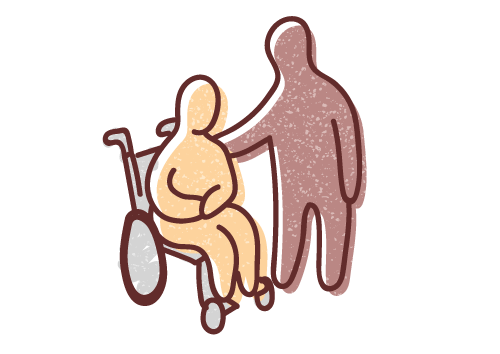What We Do
We help you build and transform your organisational culture and team awareness, bringing you closer to your clients and communities

Improving Aged Care Services Delivery
The aged care sector faces significant challenges, many of which have only been exacerbated by the Covid-19 pandemic. How well do you understand how your clients and their families experience your services? What systems do you have in place for drawing out the knowledge and insights of your team members to improve systems and enhance your clients’ customer experience? How can you ensure that all voices are listened to in your approach to service design?
Using participatory research methods and human-centred design principles, we help you develop a holistic perspective on your systems and your clients’ and their families’ needs. This helps you see and respond to challenges, and enhance the responsiveness of your care services.

Rethinking ‘working together’
How have you and your workforce adjusted to social distancing requirements and remote working opportunities under Covid-19 restrictions? What is the optimal new normal for you? What do your team members really think and feel about how to work together productively as Covid-19 restrictions end? Are you expecting digital systems and technology to just make it all work?
We help you develop workflow and employee management systems that work organically for your organisation now. By helping you tap into the tacit (hidden) aspects of your organisational culture, we equip you to keep having the right conversations so that your systems remain dynamic and organically connected to your organisation’s purpose.

Innovating Human-Centred Health Care Systems
Healthcare’s central concern is people, not diseases. Yet, despite the caring efforts of individuals within health care systems, the experience of patients and their families is often far from this ideal. What more could you be doing to incorporate human-centred design into your healthcare practice and systems? What changes would help care recipients feel treated as people and not just as patients defined by illness or impairment?
We help you see your systems and processes holistically and learn from your clients’ experience with your systems. This helps you better respond to system and process challenges and better able to hear and respond to clients’ needs.

Building empathy to work through conflict in the workplace
Differences of perspective within and between teams are a vital driver of innovation and change – if managed effectively and respectfully. If not managed effectively, or where an organisation’s vision is not fully shared, differences of perspective can lead to conflict and dissent that lowers morale and productivity.
We help you and your teams develop ways of working together effectively and respectfully, drawing on individuals’ unique perspectives to build common understandings. We guide you through positive transformation of your organisational systems and structures, co-creating with you an environment of mutual trust, respect and support.

Enhancing Service Design for Improved User Experience
How well do you know the people who are your clients or customers? How can you move beyond reasonable assumptions about what people need to a grounded understanding of what they are actually looking for? How do you get people to tell you what they really think, feel or mean? How can you respond optimally to the feedback you receive?
We bring you closer to your customers, users or client base through drawing out unconscious and embodied aspects of their awareness, knowledge and motivations, so you can build systems that are responsive to their insights.

Developing holistic learning systems
Getting the balance right between content-focused, skills-focused, and assessment-focused activities is a major challenge in any educational setting. With the added challenge of fast-paced technological and social change, learning how to learn has become a critical life skill.
We help you become more aware of the unconscious side of skills and knowledge acquisition, so you can more effectively integrate a focus on ‘learning to learn’ in your teaching and learning systems. This leads to better educational outcomes and better integration between schooling, community expectations and a constantly changing employment environment.

Putting ‘Community’ back in Community Development
Community, neighbourhood and public infrastructure development projects are always premised on being ‘for the community’ or ‘for public benefit’. Whose version of what the community wants or needs is that? How do you develop a holistic understanding of community needs and engage community respectfully in your projects?
We help you gain a holistic understanding of the varying perspectives and differential needs within a particular community.This gives you a granular evidence-based understanding of the community, and equips you for planning, designing and building systems, environments and structures that are responsive to community needs.
“We are living in a time like no other, in Australia and globally, as we contend with a pandemic of epic proportions. Your practice, Social Context, offers critically important tools for identifying tacit (unexpressed) social and cultural rules for effective and clear communication. Social Context provides the means for developing and delivering communication strategies that connect with culturally and socially diverse Australian citizens. You and your team have the knowledge, skills, tools and methods to step into this space—to assist all of us to step up—and save lives.”
We use participatory research methods from the human and social sciences to help you
- Understand your clients’ worlds so you can better meet their needs
- Develop ways of working together effectively and respectfully within your teams
- Gain a closer understanding of the pain points in your current systems
